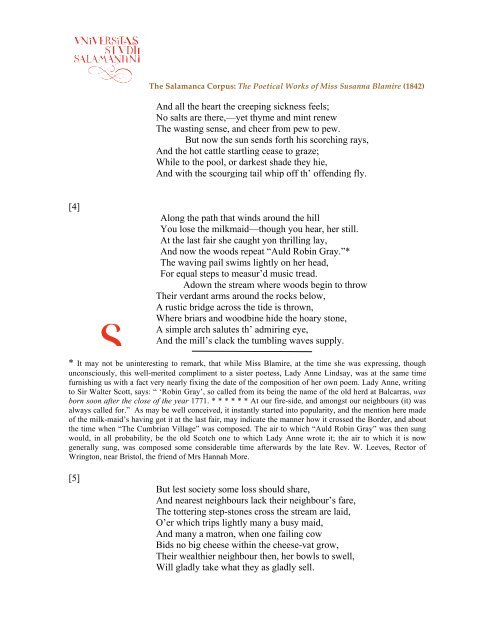The Poetical Works of Miss Susanna Blamire (1842) - Gredos ...
The Poetical Works of Miss Susanna Blamire (1842) - Gredos ...
The Poetical Works of Miss Susanna Blamire (1842) - Gredos ...
You also want an ePaper? Increase the reach of your titles
YUMPU automatically turns print PDFs into web optimized ePapers that Google loves.
<strong>The</strong> Salamanca Corpus: <strong>The</strong> <strong>Poetical</strong> <strong>Works</strong> <strong>of</strong> <strong>Miss</strong> <strong>Susanna</strong> <strong>Blamire</strong> (<strong>1842</strong>)<br />
And all the heart the creeping sickness feels;<br />
No salts are there,—yet thyme and mint renew<br />
<strong>The</strong> wasting sense, and cheer from pew to pew.<br />
But now the sun sends forth his scorching rays,<br />
And the hot cattle startling cease to graze;<br />
While to the pool, or darkest shade they hie,<br />
And with the scourging tail whip <strong>of</strong>f th’ <strong>of</strong>fending fly.<br />
[4]<br />
Along the path that winds around the hill<br />
You lose the milkmaid—though you hear, her still.<br />
At the last fair she caught yon thrilling lay,<br />
And now the woods repeat “Auld Robin Gray.”*<br />
<strong>The</strong> waving pail swims lightly on her head,<br />
For equal steps to measur’d music tread.<br />
Adown the stream where woods begin to throw<br />
<strong>The</strong>ir verdant arms around the rocks below,<br />
A rustic bridge across the tide is thrown,<br />
Where briars and woodbine hide the hoary stone,<br />
A simple arch salutes th’ admiring eye,<br />
And the mill’s clack the tumbling waves supply.<br />
* It may not be uninteresting to remark, that while <strong>Miss</strong> <strong>Blamire</strong>, at the time she was expressing, though<br />
unconsciously, this well-merited compliment to a sister poetess, Lady Anne Lindsay, was at the same time<br />
furnishing us with a fact very nearly fixing the date <strong>of</strong> the composition <strong>of</strong> her own poem. Lady Anne, writing<br />
to Sir Walter Scott, says: “ ‘Robin Gray’, so called from its being the name <strong>of</strong> the old herd at Balcarras, was<br />
born soon after the close <strong>of</strong> the year 1771. * * * * * * At our fire-side, and amongst our neighbours (it) was<br />
always called for.” As may be well conceived, it instantly started into popularity, and the mention here made<br />
<strong>of</strong> the milk-maid’s having got it at the last fair, may indicate the manner how it crossed the Border, and about<br />
the time when “<strong>The</strong> Cumbrian Village” was composed. <strong>The</strong> air to which “Auld Robin Gray” was then sung<br />
would, in all probability, be the old Scotch one to which Lady Anne wrote it; the air to which it is now<br />
generally sung, was composed some considerable time afterwards by the late Rev. W. Leeves, Rector <strong>of</strong><br />
Wrington, near Bristol, the friend <strong>of</strong> Mrs Hannah More.<br />
[5]<br />
But lest society some loss should share,<br />
And nearest neighbours lack their neighbour’s fare,<br />
<strong>The</strong> tottering step-stones cross the stream are laid,<br />
O’er which trips lightly many a busy maid,<br />
And many a matron, when one failing cow<br />
Bids no big cheese within the cheese-vat grow,<br />
<strong>The</strong>ir wealthier neighbour then, her bowls to swell,<br />
Will gladly take what they as gladly sell.
















